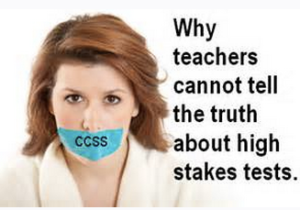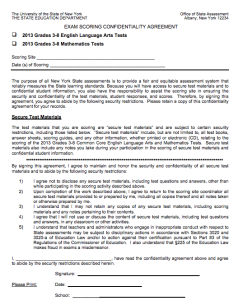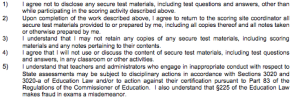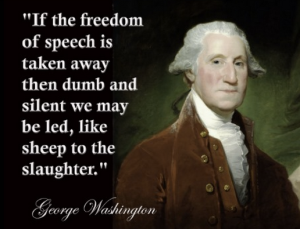By now you have probably heard about the gag orders that the NYSED/Pearson contract requires teachers sign.
For ex:
The Education Department has said it wants to be able to use tests and test questions more than once in order to save money. Accordingly, they claim, teachers are forbidden to discuss the tests.
NYSUT filed a lawsuit alleging that NYSEDs gag order violates teachers First Amendment rights and stymies their ability to do their jobs. NYSUT argues if – “in the important process of evaluating testing materials – some questions are compromised by their disclosure, teachers would gladly help in the development of new tests. ” http://www.lipolitics.com/blog/2014/10/14/new-york-teachers-gagged-claims-teachers-union/
In the spring of 2012, numerous errors were found in one of the tests designed by Pearson Education for NYSED which problems persisted into 2013 and 2014 testing seasons. Product placement was found and the quality of the test questions were seriously concerning to parents and teachers who felt a great deal of disapproval in being told that they were not permitted to discuss or examine the tests that children had been subjected to.
Educators have been dying to discuss their concerns and parents are desperate to hear from teachers for the sake of their kids. Teachers have been stymied from sharing info by this purported “gag order.”
Well, apparently NYSED must have missed the memo.
According to Pearson’s CEO John Fallon, there is NO gag order and teachers are free to discuss their overrall opinions of the test.
In a blog post regarding testing on the Pearson website, Fallon writes:
“It’s a complex system and one that, working with the education community, we’re constantly looking to improve. With all that going into creating an assessment, it’s understandable when confusions arise. A recent example – that there are “gag orders” in these contracts – is in danger of becoming a popular misconception. Let’s be clear: there are no gag orders in testing contracts. There are steps taken to ensure that questions and answers are secure during the testing process and are not leaked to the public so each student has a fair chance to show what they have learned, and states work to protect their intellectual property. But there is nothing in any contract to prevent teachers from voicing their overall opinions. In fact, we believe that progress can only be made if everyone contributes to improving the system.”
http://blog.pearson.com/learning-about-tests/
Hmmmm…..
“……There are steps taken to ensure that questions and answers are secure during the testing process and are not leaked to the public so each student has a fair chance to show what they have learned, and states work to protect their intellectual property….In fact, we believe that progress can only be made if everyone contributes to improving the system.”
It would seem to me, that Fallon claims that excepting screenshots of the test and verbatim representations of the questions, teachers should feel free to discuss the tests with sufficient particularlity that it could actually help them do their own jobs?
New York officials signed a $32 million five-year contract with Pearson PLC ‘s subsidiary, NCS Pearson Inc., in 2011 for its Common Core test merchandise. The contract expires December 2015.
Apparently, the 2011 Pearson/NYSED agreement stipulated that the exams would be classified and not subject to public review or educators’ criticism. Educators were asked to sign non disclosure agreements to purportedly protect “the integrity of the testing process.”
In a 2013 piece about this subject, “Gagging Teachers, Selling Student Data: Test Secrecy and Privacy Rights Under the Common Core State Standards Regime” blogger Mark Garrison writes:
“What most people don’t know is that with the adoption of the Common Core State Standards Initiative (CCSSI), the New York State Education Department (NYSED) has instituted a provision to limit the speech of professional educators beyond what I think would normally be considered reasonable or necessary. I wonder if this has occurred in other states.
These limitations are broad and indefinite, and govern educator conduct in and out of school.
I am speaking of the “Exam Scoring Confidentiality Agreement” and directives to teachers articulated in the test-administration manuals. Teachers score portions of the exams, once they have been “calibrated” by Pearson/NYSED. This is a process whereby teachers are forced to evaluate student responses as Pearson/NYSED wish, resulting, according to some teachers, in more student failure. Note that school administrators indicate, in jest, that they must sign the form in blood (I assume they’re joking).
To my knowledge, no such agreement existed when teachers constructed and graded Regents exams, as was the practice many years ago — an education past that few seem to know about.[1] This earlier practice was before test development was contracted out to powerful for-profit publishing companies that have come to dominate education policy and practice.
There are some fairly obvious problems with the Agreement.
The first problem is that the language of the Agreement is overly broad. “I agree that I will not use or discuss the content of secure test materials, including test questions and answers, in any classroom or other activities.” For how long one must be silent? If a teacher discusses a test item at a Christmas party this coming December, is she in violation of the agreement? What happens if a student wants to discuss a test item a week after the test has been completed? The “Teacher’s Directions” manual says: “At no time may the contents of the test books be reviewed, discussed, or shared through any electronic means.” Of course the contents should not be shared during the week of testing. But the other restrictions are striking in their reach.
A second problem is this: the restrictions absolutely contradict the propaganda that these tests are to help teachers improve their teaching, and thus, help students. If teachers are not allowed to discuss the content, how might it inform their practice?[2] How are teachers to respond to student questions about last week’s test items? “I’m sorry Mark, but I was required to sign an agreement barring me from even talking about the test with you. This is to ensure you are ‘career and college ready’.”
And, by not being able to discuss the actual test and how students responded, teachers and the public are pressured to rely solely on official versions of what the tests results mean. This is a means for blocking knowledge of direct experience for both teachers and students and imposing the official interpretation of state authorities.
Yet, there is another significant problem. Is it not a violation of the basic principle of due process to block teachers from discussing the standard that is used to judge their performance and ultimately their employment status? “I judge you ineffective, but you cannot see the evidence!”
http://www.markgarrison.net/archives/1545
You see the dilemma, dont you?
Although touted as a measure to facilitate test integrity, the non-disclosure agreement effectively precludes teachers from actually examining the tests and drawing conclusions that could help their students learn nor are teachers given the chance to improve upon the quality of the test itself.
Then, in stunning slap on the face, THOSE tests that they cannot see, speak about or discuss are used against them in evaluating teacher effectiveness.
Does this system make any sense? No. Of course not.
Pearson says that the state is responsible for the gag order, not it.
The non disclosure agreement states:
Without debate as to the veracity of the clause, tshe proviso seems to cover actual test questions and precludes teachers from disclosing the same, but there is nothing in the agreement that precludes teachers from issuing their opinion about the tests which conclusion is validated by Pearson CEO Fallon as discussed above.
Indeed, public funds paid for the Pearson contract so it is unlikely that if challenged the suppression order will withstand judicial scrutiny but it is concerning that one or both of the parties believed they could stifle free speech.
Regardless, Pearson CEO specifically posits that there is no gag order and suggests that teachers are welcome to express their overrall opinions on the same.
There you have it.
Teachers across the state of New York – be advised! Straight from the Pearson CEO John Fallon – there is NO gag order.
By all means, feel free to voice your opinions about the NYSED/Pearson common core tests!






Reblogged this on stopcommoncorenys.
I live in NJ and from what I understand in Union/Union County the teachers have been either gagged or scared to talk about or against Parcc…they are told to encourage kids to take it..
Please note that in the Adminisrator’s Manual for NYS assessments, it states that teachers can not even READ the test.